Misconceptions About Kwanzaa: Is Kwanzaa Black Christmas?
- By kwende ukaidi
- •
- 23 Nov, 2021
- •
Celebrating the Wonderful Observance of Kwanzaa

Kwanzaa is a wonderful
celebration of Afrikan family and community. It is a time to celebrate the
self-determined efforts Afrikan people have made to cultivate, better and
secure themselves throughout the annual cycle. Indeed, Kwanzaa observance is
born of same the self-determined thrust that has naturally been with Afrikan
souls from the beginning. Throughout the ages Afrikan people have rightfully
and for best possible functioning lived according to the way of life of their
own making. Afrikan culture and its necessary cultural celebrations are brought
forth by this primary people for that culture to service and elevate the best
living appropriate for optimally flourishing self throughout its various
levels.
Despite the efforts of others that mean the Afrikan ill to destroy Afrikan life and culture during the Maafa of recent centuries, Kwanzaa emerges as the result of organised self-determined Afrikan effort to creatively restore their own cultural fabric. Rooted in the harvesting traditions of Afrikan people this grand Afrikan cultural celebration of seven days begins on the 26th December until the 1st of January. The word Kwanzaa itself is derived from the Kiswahili phrase Matunda ya Kwanza meaning First Fruits (as the bountiful fruit or yield of the harvest).
By contrast, the period of time referred to as Christmas is completely different with a single day outside of the Afrikan celebratory period designated for its time. According to a popular mainstream platform Christmas is defined as:
“the annual Christian festival celebrating Christ's birth, held on 25 December in the Western Church”
Clearly, Christmas is a day designated by those of the Christian religion, and (accordingly to this quoted source) is the preserve of this religion in its institutions of the West. There is no comparison to be made here and perhaps misconceptions have come about simply because of the close proximity of time in that the day of the day of note to adherents of the Christian religion (in particular its western branches) is on the 25th December and the first day of Kwanzaa is on the 26th.
Beautifully positioned within the popularised calendar cycle, Kwanzaa does take advantage of a time when many Afrikans will be on holiday as many institutions around the world close during this period. Therefore, allowing the Kwanzaa celebration to have concentrated levels of focus for joyous celebration. Kwanzaa also wonderfully joins the conclusion of the year with the coming of the new year allowing for reflection and projection to be fully realised for progressive life expression.
In further examination, the notion of the west is important to highlight. According to another popular mainstream platform the west is described in the following way:
“The Western world, also known as the West, refers to various regions, nations and states, depending on the context, most often consisting of the majority of Europe, Northern America and Australasia. The Western world is also known as the Occident (from the Latin word occidens, "sunset, West"), in contrast to the Orient (from the Latin word oriens, "rise, East") or Eastern World. It might mean the Northern half of the North-South Divide, the countries of the Global North (often equated with developed countries). The concept of the Western part of the earth has its roots in the theological, methodological and emphatical division between the Western Roman Catholic and Eastern Orthodox Churches. The West was originally Western Christiandom”
It could clearly be argued that the Western as used in this regard refers not to geography but rather who has dominion or control over particular spaces originating out of specific religious hegemony.
Kwanzaa has no such origination. Kwanzaa is a time to celebrate the primary people of creation blessed by the sun and its brilliancy of rising. Kwanzaa is a time to celebrate Afrikan family, community, nation and world community wherever in the world located. Rooted in harvesting traditions from ancient and continuing times, Kwanzaa celebrates the cultivation, development, growth and bountiful yield of self-determined life expression in the upliftment of Afrikan souls.
In short, the wonderful Afrikan seven-day observance of Kwanzaa has
nothing to do with Christmas. To suggest Kwanzaa is a Black Christmas is a gross misconception.
Kwanzaa is one of the essential cultural observances of life within the
Universal Royal Afrikan Nation. The Universal Royal Afrikan Nation (URAN) is an
Afrikan-centred spiritual and cultural mission for ascendancy that embodies
living spiritually and culturally rooted life. To find out more about URAN and
its spiritual-cultural mission for liberty and nationhood click here. The exquisite URAN pendant can be
obtained online by clicking
here.
In his capacity as an Afrikan-centred spiritual cultural practitioner this author is available for further learning in this regard and also for the carrying out of ceremonies such as naming and name reclamation. For details please click here.
Afrikan World Studies programmes are an important forms of study in understanding the Afrikan experience. There are a range of subjects covered on these programmes including History, Creative Production, Psychology and Religion. To find out more about these learning programmes please click here. For the video promo for these learning programmes click here.
Also, in the approach to the important cultural observance of Kwanzaa, the text: From Pert-En-Min to Kwanzaa - A Kuumba (Creative) Restoration of Sacred First Fruits by this author is available to purchase online here. This publication provides informative detail on the of the Kwanzaa celebration. You can also visit the institution of Yemanja to pick up a copy.
At nominal cost, also consider acquisition of an a4 laminate poster of articulations by this author when visiting the Yemanja institution to enrol, consult, learn, gather or otherwise.
Also, visit www.u-ran.org for links to Afrikan liberation Love radio programme on Universal Royal Afrikan Radio online.
